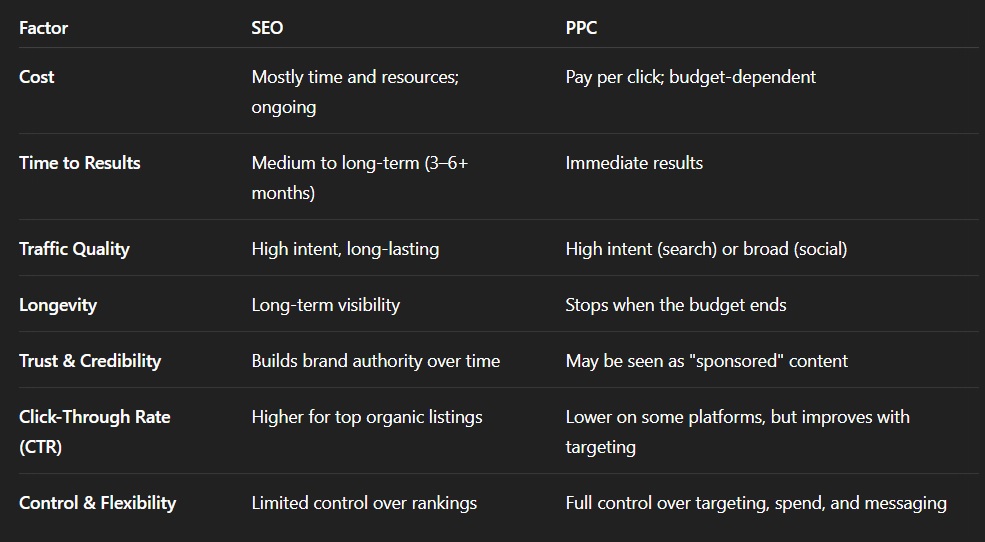Menu
Talk To Expert
020 8133 6393In 2025, businesses face more online competition than ever. With digital marketing constantly evolving, deciding between SEO (Search Engine Optimization) and PPC (Pay-Per-Click) advertising can be tricky. Both strategies offer value, but the key is determining which aligns with your business goals, budget, and timeline.
In this blog, we'll explore the differences between SEO and PPC, their pros and cons, and how to decide the best strategy for your Business in 2025.
SEO is optimizing your website to rank organically on search engines like Google. This includes improving content quality, technical structure, backlinks, and user experience to increase visibility.
PPC is a form of paid advertising where businesses pay each time someone clicks on their ad. These ads appear at the top of search results or across platforms like Google Ads, Facebook, LinkedIn, and YouTube.

Your ideal strategy depends on your industry, budget, timeline, and growth goals. Let's break it down by scenario:
Recommendation: PPC first, then invest in SEO
Why: PPC offers quick visibility and helps you test what works. You can use data from PPC to inform your SEO strategy later. Start building SEO foundations early, but use PPC to generate leads and awareness while SEO grows.
Recommendation: Hybrid of PPC + SEO
Why: SEO helps rank product pages and content over time. PPC (Google Shopping, social ads) drives sales during promotions or peak seasons. Retargeting ads help recover abandoned carts.
Recommendation: Local SEO + Google Ads
Why: Local SEO boosts map visibility and helps with organic traffic over time. Google Ads brings instant phone calls or form submissions, especially when optimized for local intent keywords (e.g., "plumber near me").
Recommendation: SEO + LinkedIn Ads or Google Search Ads
Why: SEO helps establish authority through blog content and whitepapers. LinkedIn Ads and Google PPC target decision-makers directly with lead forms or webinars.
Recommendation: Focus on SEO with PPC for promotions
Why: If your site has authority, SEO can cost-effectively drive most of your traffic. Use PPC to support product launches, new markets, or time-sensitive offers.
In 2025, businesses that succeed online use a combination of SEO and PPC. Here's why a blended strategy works best:
There's no one-size-fits-all answer when it comes to SEO vs PPC. The right strategy depends on where your Business is today—and where you want it to be tomorrow.
If you need results fast, PPC is the answer.
If you're thinking of long-term growth, invest in SEO.
If you want to dominate your market, do both strategically.
In 2025, success belongs to businesses that understand their audience, use data to make decisions, and balance short-term gains with long-term growth.